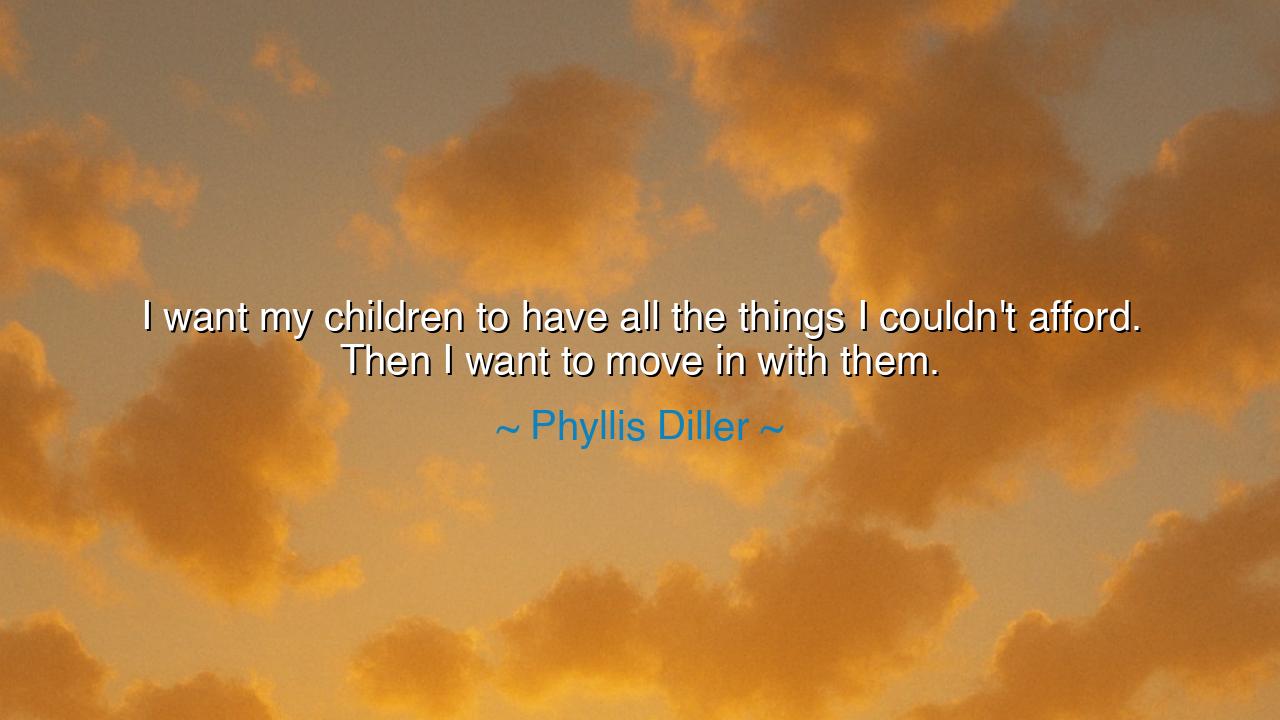
I want my children to have all the things I couldn't afford. Then
I want my children to have all the things I couldn't afford. Then I want to move in with them.






In the timeless dance of life and family, there are moments when words, simple yet profound, echo through the corridors of human experience, offering insight into the nature of love, sacrifice, and the joy of giving. Phyllis Diller, with her signature wit and humor, once shared a sentiment that is as touching as it is humorous: “I want my children to have all the things I couldn’t afford. Then I want to move in with them.” Though spoken in jest, these words are imbued with the truth of a parent’s love—selflessness, generosity, and the unspoken desire to see the next generation enjoy the fruits of their labor.
The idea of wanting for one’s children what one could not have is as old as the very concept of parenthood itself. In the ancient world, it was common for parents to labor tirelessly not for their own comfort, but for the well-being of their children. King Solomon, the wise ruler of Israel, spoke often of the value of wisdom and the importance of passing it down through generations. In his wisdom, Solomon recognized that the inheritance of wealth was fleeting, but the inheritance of knowledge, values, and experiences would last far beyond material possessions. Phyllis Diller’s quote speaks to a similar desire: to give her children not just material wealth, but the opportunity to experience life in a way she once could not.
But Diller’s words also carry with them a certain irony—the idea of giving everything to your children and then seeking to return to them, almost as if to say that the very gifts you give are the bonds that tie you closer to them. There is a beautiful paradox in this wish: to give your children everything you could not have, and yet, in the end, seek to move in with them, not out of need, but out of the deep, unbreakable bond of family. In this, there is a subtle truth about the nature of love and sacrifice. What is the true value of the things we give if not to connect us to those we love? What are the riches of the world if we cannot share them with those who matter most?
In ancient myths, parents were often depicted as making great sacrifices for their children, whether it was Cronus, who swallowed his own children to protect them from a fate he had seen, or King Midas, whose love for his daughter led him to regret his desire for wealth when everything he touched turned to gold. Yet, these stories also contain lessons of humility and the understanding that wealth and power are fleeting, and that the true treasure lies in the relationships we build and the love we share. Diller’s quote, too, reflects the understanding that no matter how much we give, what we ultimately seek is not the material wealth we could never afford, but the connection and companionship that make life meaningful.
The lesson to be gleaned from Diller’s playful words is simple yet profound: love is the true wealth of the human heart. As parents, we desire to offer the world to our children, to give them the opportunities and comforts we never had. But we must remember that, in the end, it is not the things we give that define us, but the love, the wisdom, and the presence we offer. Diller’s wish to “move in” with her children after providing them everything speaks to the simple, timeless truth that what we truly seek in life is not separation from those we love, but the closeness and companionship of family, even after we have given everything to them.
To take this lesson into our own lives, we must reflect on the relationships that matter most to us. In the pursuit of success, wealth, and security, let us not forget that these are fleeting and can never replace the love and connection we share with our children, our family, and our closest loved ones. As we build our lives and accumulate riches, let us remember that it is not the material wealth we leave behind that matters most, but the relationships we nurture and the love we share. Whether or not we are able to give our children every material possession we never had, let us strive to give them something far more valuable: our time, our presence, and our wisdom.
In the end, the true inheritance we leave behind is not the things we give, but the legacy of love we build. Just as Phyllis Diller playfully suggests, we must seek not just to provide, but to remain close to those we cherish. For in this closeness, we find that the greatest treasure lies not in what we can afford, but in the bonds of family and the love that transcends all material wealth.






AAdministratorAdministrator
Welcome, honored guests. Please leave a comment, we will respond soon